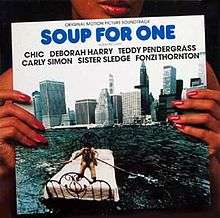Soup for One (soundtrack)
Soup for One is the soundtrack album to the movie Soup for One by American R&B band Chic et al., released by Mirage Records in 1982. The album reached number 168 on the Billboard 200 albums chart and number 42 on the R&B chart. Besides three previously released tracks, Chic's "I Want Your Love" from 1978 album C'est Chic, Sister Sledge's "Let's Go On Vacation" from 1980s Love Somebody Today and "Jump, Jump" from Debbie Harry's KooKoo, the album contains five songs specifically written and produced by Bernard Edwards and Nile Rodgers for the movie.
| Soup for One | ||||
|---|---|---|---|---|
 | ||||
| Soundtrack album by | ||||
| Released | May 2, 1982 | |||
| Recorded | 1978–1982 | |||
| Genre | Disco, funk, R&B | |||
| Length | 36:46 | |||
| Label | Mirage | |||
| Producer | Nile Rodgers, Bernard Edwards | |||
| Chic chronology | ||||
| ||||
| Singles from Soup for One | ||||
| ||||
Chic's title track stalled at number 80 on the US Pop chart, but was a Top 20 hit on the R&B singles chart, peaking at number 14, making it their best R&B chart entry since 1980s "Rebels Are We". "Why" with vocals by Carly Simon was only moderately successful on its initial release in the US (Pop No. 74, September 1982), tbut he song turned out to be a surprise hit in Europe, where it reached number 10 on the singles charts in the UK. Later, the extended 12" remix—featuring additional vocals by Chic's Alfa Anderson and Luci Martin—also became something of an underground club classic in the US. The Soup for One album also includes Chic's one and only collaboration with legendary soul singer Teddy Pendergrass, the ballad "Dream Girl". Pendergrass had a cameo role as a nightclub singer performing the song in the movie, although it was however never issued as a single. Long-standing Chic vocalist Fonzi Thornton's track "I Work for a Livin'" is taken from what was planned to be his first solo project. The album entitled "Frostbite" was recorded in 1981/82, and was written and produced by Bernard Edwards and Nile Rodgers, but remains unreleased. Chic also wrote the track "Riding", sung by Fonzi, which appeared in the film, but was not included on the soundtrack album. This track was originally intended for Fonzi Thornton's unreleased solo project. "Tavern on the Green" is an acoustic guitar piece and another instrumental Chic track, "Open Up" from 1980s Real People, also appeared in the film but was not included on the soundtrack album. Paradoxically, Carly Simon's "Why", the biggest hit single from the album, was not featured in the film.
A Tribe Called Quest sampled "Why" for their 1990 hit "Bonita Applebum", as did British rapper Glamma Kid in 1999, taking the song back up to number 10 on the UK Singles Chart. Chic's "Soup for One" was sampled by French dance act Modjo for their 2000 song "Lady (Hear Me Tonight)", a number 1 hit in most of Europe. The Soup for One album was released on compact disc in 2015.
Track listing
All tracks written by Bernard Edwards and Nile Rodgers unless otherwise noted.
- Side A
- Chic - "Soup for One" - 5:35

- Carly Simon - "Why" - 4:06

- Teddy Pendergrass - "Dream Girl" - 4:10
- Fonzi Thornton - "I Work for a Livin'" - 3:31
- Side B
- Chic - "I Want Your Love" - 6:58
- Sister Sledge - "Let's Go On Vacation" - 5:09
- Chic - "Tavern on the Green" - 2:15
- Deborah Harry - "Jump, Jump" (Harry, Chris Stein) - 4:04
Personnel
- Bernard Edwards - Lead vocals, bass guitar
- Carly Simon - Lead vocals
- Teddy Pendergrass - Lead vocals
- Fonzi Thornton - Lead vocals
- Alfa Anderson - Lead vocals
- Debbie Sledge (Sister Sledge) - Lead vocals
- Joni Sledge (Sister Sledge) - vocals
- Kathy Sledge (Sister Sledge) - vocals
- Kim Sledge (Sister Sledge) - vocals
- Deborah Harry - Lead vocals
- Nile Rodgers - guitar, vocals
- Tony Thompson - drums
- Luci Martin - vocals
- Michelle Cobbs - vocals
- Jocelyn Brown - vocals
- Diva Gray - vocals
- Robin Clark - vocals
- Raymond Jones - keyboards
- Andy Schwartz - keyboards
- Sammy Figueroa - percussion
- Meco Monardo - horns
- Robert Millikan - horns
- Eddie Daniels - horns
- José Rossi - tubular bells
- Chic Strings - strings
Production
- Bernard Edwards - record producer for Chic Organization Ltd.
- Nile Rodgers - producer for Chic Organization Ltd.
- Bob Clearmountain - sound engineer
- Bill Scheniman - engineer
- Scott Litt - engineer
- Jason Corsaro - assistant engineer
- Jeff Hendrickson - assistant engineer
- Josh Abbey - assistant engineer
- Dave "The Rave" Greenberg - assistant engineer
- Barry Bongiovi - assistant engineer.
- Recorded and mixed at Power Station NYC.
- Mastered at Atlantic Studios NYC.
Single releases
All tracks written by Bernard Edwards and Nile Rodgers.
7" Chic: "Soup For One". Mirage Records (US)/WEA Records (Europe), July 1982.
- "Soup For One" (7" Edit) - 3:08 / "Burn Hard" (7" Edit) - 3:39
12" Chic: "Soup For One". Mirage/WEA, July 1982.
- "Soup For One" (12" Mix) - 7:58 / "Burn Hard" (Album Version) - 5:12
7" Carly Simon: "Why". Mirage/WEA, August 1982.
- "Why" (7" Edit) - 3:33 / "Why" (7" Instrumental) - 3:33
12" Carly Simon/Chic: "Why". Mirage/WEA, August 1982.
- Carly Simon: "Why" (12" Mix) - 8:11 / Chic: "Why" (12" Instrumental) - 7:06